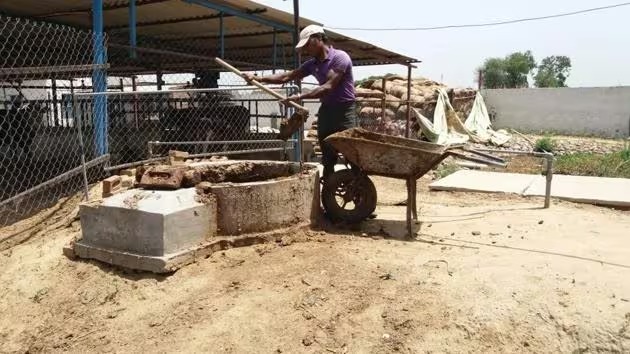
Lucknow, Oct 27 : In a bid to provide relief to residents of Uttar Pradesh from pollution caused by stubble burning, the Yogi government is gearing up to produce Compressed Natural Gas (CNG) from stubble in the state, which will provide income as well as employment to a large number of people.
Official sources said that the effort will also lead to the production of pure organic fertiliser, contributing to the promotion of green energy and better health outcomes.
Sources said that after Chief Minister Yogi Adityanath released the Bio-Energy Policy 2022 to promote bio-fuel in UP and encourage large scale investment in the sector many big investors had signed MoUs with the state government during the Global Investors Summit in this regard, which are going to see the light of the day soon.
The state government had set a target to establish biogas plants in every tehsil, some of which will soon become operational. One of the upcoming operational plants is Buland Biogas in Bulandshahr, situated in the Lahugala tehsil. Buland Biogas had signed an MoU worth Rs 18.75 crore with the state government, the cost of which has now increased to Rs 21 crore.
This plant will commence production in December and is projected to yield 3 tonnes of CNG per day. This production will contribute to reducing the state’s dependence on petrol and diesel and the initiative is expected to generate employment opportunities for 80 to 100 people, including both skilled and unskilled workers.
Owner of Buland Bio Gas Athar Ahmed said that the plant produces not only straw but also degradable waste like straw, cow dung, chaff, sugarcane waste, municipal waste or a mixture of all the gases. “With the help of this technology, CNG is purified. The license for this plant has been obtained from Indian Oil,” he said.
He said that the most noteworthy aspect of this project is the bulk production of organic fertiliser. All the waste generated during the compressed gas production process is 100 percent organic, consisting of both solid and liquid components.
Ahmed said that the liquid organic fertiliser produced by the plant will be distributed free of cost to farmers for a period of three years, with the identification of eligible farmers being the responsibility of the District Magistrate or Chief Development Officer (CDO). “This initiative aims to assist farmers who may face difficulties in purchasing fertilizers such as DAP and urea,” he said.
He said that the advantages of organic and liquid fertilisers are manifold. “Traditional fertilisers form a dense layer on the soil, which takes time to reach the roots of trees and plants. In contrast, organic fertilisers can reach the roots within two to three hours, significantly enhancing their effectiveness. This not only benefits farmers, but also makes organic products available to people, improving their overall health,” he said.






